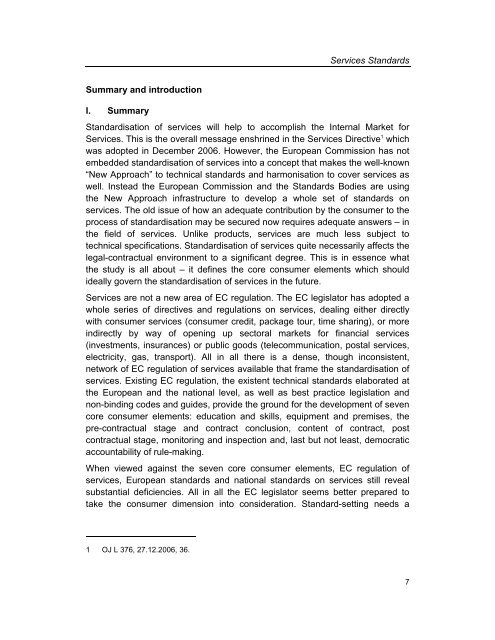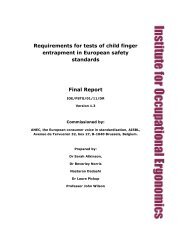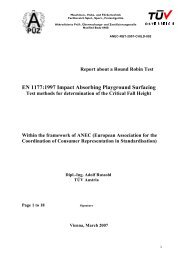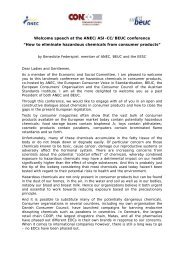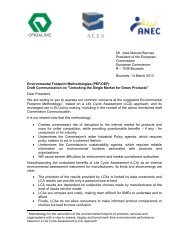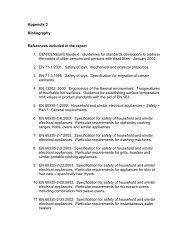Services Standards: Defining the Core Consumer Elements ... - ANEC
Services Standards: Defining the Core Consumer Elements ... - ANEC
Services Standards: Defining the Core Consumer Elements ... - ANEC
You also want an ePaper? Increase the reach of your titles
YUMPU automatically turns print PDFs into web optimized ePapers that Google loves.
<strong>Services</strong> <strong>Standards</strong><br />
Summary and introduction<br />
I. Summary<br />
Standardisation of services will help to accomplish <strong>the</strong> Internal Market for<br />
<strong>Services</strong>. This is <strong>the</strong> overall message enshrined in <strong>the</strong> <strong>Services</strong> Directive 1 which<br />
was adopted in December 2006. However, <strong>the</strong> European Commission has not<br />
embedded standardisation of services into a concept that makes <strong>the</strong> well-known<br />
“New Approach” to technical standards and harmonisation to cover services as<br />
well. Instead <strong>the</strong> European Commission and <strong>the</strong> <strong>Standards</strong> Bodies are using<br />
<strong>the</strong> New Approach infrastructure to develop a whole set of standards on<br />
services. The old issue of how an adequate contribution by <strong>the</strong> consumer to <strong>the</strong><br />
process of standardisation may be secured now requires adequate answers – in<br />
<strong>the</strong> field of services. Unlike products, services are much less subject to<br />
technical specifications. Standardisation of services quite necessarily affects <strong>the</strong><br />
legal-contractual environment to a significant degree. This is in essence what<br />
<strong>the</strong> study is all about – it defines <strong>the</strong> core consumer elements which should<br />
ideally govern <strong>the</strong> standardisation of services in <strong>the</strong> future.<br />
<strong>Services</strong> are not a new area of EC regulation. The EC legislator has adopted a<br />
whole series of directives and regulations on services, dealing ei<strong>the</strong>r directly<br />
with consumer services (consumer credit, package tour, time sharing), or more<br />
indirectly by way of opening up sectoral markets for financial services<br />
(investments, insurances) or public goods (telecommunication, postal services,<br />
electricity, gas, transport). All in all <strong>the</strong>re is a dense, though inconsistent,<br />
network of EC regulation of services available that frame <strong>the</strong> standardisation of<br />
services. Existing EC regulation, <strong>the</strong> existent technical standards elaborated at<br />
<strong>the</strong> European and <strong>the</strong> national level, as well as best practice legislation and<br />
non-binding codes and guides, provide <strong>the</strong> ground for <strong>the</strong> development of seven<br />
core consumer elements: education and skills, equipment and premises, <strong>the</strong><br />
pre-contractual stage and contract conclusion, content of contract, post<br />
contractual stage, monitoring and inspection and, last but not least, democratic<br />
accountability of rule-making.<br />
When viewed against <strong>the</strong> seven core consumer elements, EC regulation of<br />
services, European standards and national standards on services still reveal<br />
substantial deficiencies. All in all <strong>the</strong> EC legislator seems better prepared to<br />
take <strong>the</strong> consumer dimension into consideration. Standard-setting needs a<br />
1 OJ L 376, 27.12.2006, 36.<br />
7


